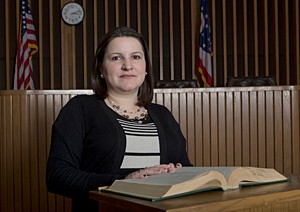
The Challenges for Anthropologists When They re the Expert in the Courtroom
The roles of cultural anthropologists as expert witnesses gets a national hearing of its own, as researchers examine how cultural anthropology is applied in the courtroom. The session, Anthropologists as Expert Witnesses: Theory, Practice and Ethics, will be held on Thursday, March 26, at the 75th annual meeting of the Society for Applied Anthropology (SfAA) in Pittsburgh.
, a University of Cincinnati assistant professor of anthropology, is organizer and presenter following her own experience testifying in a sexual abuse case against a Mexican immigrant.
Rodriguez says theres little publishing on the issue. The session will examine the difference between an informant and a client; how the legal system defines culture and interprets cultural facts; and how anthropology is used to prepare cases in the courtroom.
I think the legal systems understanding of culture is very different from how anthropologists define culture, explains Rodriguez. The legal system often is looking for something with clear limits around it the black-and-white answer when most of our answers as anthropologists are gray.
Rodriguez adds that some of the very ethical pillars of the profession can come into question, depending on whats expected of anthropologists as expert witnesses. If Im collecting data in a survey or interview, the respondent has a clear understanding of why I want the data and how Im going to protect that persons privacy. That cannot be guaranteed for someone whos involved in a legal case.
Rodriguez will present on her own experience after she was hired by the defense as an expert witness in the case of a Mexican immigrant, accused by his ex-wife, a white American, of sexually abusing his stepdaughter. For her testimony, Rodriguez conducted research surrounding cultural beliefs of bed-sharing behavior between adults and children, focusing on opinions of Mexican and white-American individuals.
The attorney indicated that if my findings served the defendant, then she would use them in court, but it turned out I had mixed results, says Rodriguez. Mexicans were more diffuse in their beliefs whereas the white Americans beliefs were strict. With that finding, it suggests beliefs that might be very central to one culture may not be very important to another culture. Ultimately, I didnt need to testify because the defendant took a plea deal.

This is a photo of UC anthropology researcher Leila Rodriguez in the mock courtroom in UC's College of Law.
Rodriguez says her paper also focuses on different approaches that anthropologists take to their research and how that can affect testimony in the courtroom. In cultural anthropology, theres the strict as close to scientific methodology camp, and then there are the critical or interpretive anthropologists who have their own way of collecting data. The approaches are very different, explains Rodriguez. If we differ in our approaches to collecting data, how does that stand up in court?
Rodriguez adds that in the U.S. and western Europe, anthropologists are most commonly called to testify in asylum cases someone from another country is seeking asylum and needs to prove why they need to escape their home country. In the U.S., she says anthropological testimony is often used as a defense. So we need to learn how to navigate that, to give the legal system an understanding that culture exists, that there are cultural differences that shape human behavior and the way we see the world. But at the same time, we need to not fall into these deterministic definitions: Its my culture, so I couldnt help what I did.
The presentations in the session include:
Guilt, Innocence and Ethnography: Informants and Expert Witness
Presenter
: Jeffrey H. Cohen, The Ohio State University
Judicial Ignorance and Expert Witnesses in Asylum Cases
Presenter
: Murray Leaf, University of Texas at Dallas
Anthropology in Organizations with Humanitarian Programs for Immigrants
Presenter
: Alicia Re Cruz, University of North Texas
The Epistemology of Expertise: Scientific Anthropology and Expert Witness Testimony in a Criminal Case
Presenter
: Leila Rodriguez, University of Cincinnati
The Role of Culture in Expert Witness Testimony
Presenter:
Kendall Thu, Northern Illinois University
Expert Witness: Asylum vs. Criminal Proceedings with Central American Immigrants in U.S. Courts
Presenter:
Allan Burns, University of Florida
The Unaccompanied Minor Crisis: Advocacy, Activism and Analysis
Presenter
: Patricia Foxen, National Council of La Raza
Entangled Ethnography and the Ethics of Expertise
Presenter:
Lisa Maya Knauer, University of Massachusetts Dartmouth
Expert Witnessing in Honduran Asylum Cases: What Difference Can Twenty Years Make?
Presenter:
James Phillips, Southern Oregon University
Can I Get a Witness? A Lawyers Perspective on the Critical Role of Experts in Saving Lives
Presenter:
Virginia Raymond, immigration attorney
The SfAA promotes interdisciplinary research in addressing issues affecting human beings around the world. With over 2,000 members, the society is the pre-eminent international organization in the field. The theme for the 75th annual meeting is Continuity and Change.
UCs Department of Anthropology
in the
McMicken College of Arts and Sciences (A&S)
is involved in active field research stretching from Madagascar to Mongolia. Its emphasis on research and teaching covers bio-evolutionary approaches to health, ecosystem dynamics and forms of social inequality.
Rodriguez recently received a workshop grant from the Wenner-Gren Foundation for Anthropological Research to support her project, Theory, Epistemology and Ethics of Anthropological Cultural Expertise in the Americas. The workshop will be held at the University of Cincinnati next fall and is expected to host 10 cultural anthropologists from Latin America.
Related Stories
UC students recognized for achievement in undergraduate research
April 30, 2025
The University of Cincinnati recognizes undergraduate student researchers for outstanding achievement in the sciences and humanities.
UC recognizes students for innovation achievement and leadership
April 30, 2025
Read about the University of Cincinnati’s undergraduate innovation awards for 2025.
Alarming levels of bacteria found at Burnet Woods
April 25, 2025
UC Associate Professor Bob Hyland talks to WCPO about the latest findings of UC's environmental testing at Burnet Woods.
